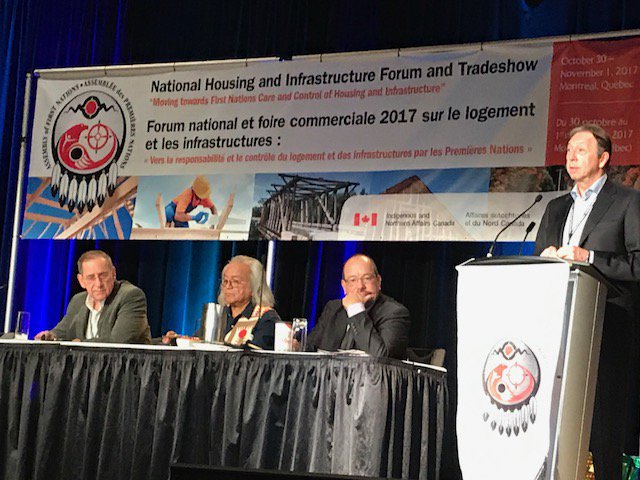This week, experts have gathered in Montreal, Quebec to collaborate on First Nations-led solutions to the housing and infrastructure crisis facing many First Nations at the First Nations Forum to Address Housing & Infrastructure Crisis.
AFN Manitoba Regional Chief Kevin Hart, who holds the Water, Housing and Infrastructure portfolio for AFN, said: “The status quo for First Nations is not acceptable. We cannot continue to live in third world conditions with communities that do not have proper infrastructure and safe drinking water.”
Many of the sessions are focused on high-level financing, data, planning, and governance. This week has shown a the momentum that First Nations-led organizations are gaining in water resource management and project development.
“Canada must make the required investments now,” said Hart. “These investments will directly benefit First Nations who face significant housing and infrastructure gaps. This is our opportunity to lead this transformative change.” As of September 30th, 2017, in 98 First Nations communities south of the 60th parallel there were 43 short-term DWAs, meaning there was a temporary water quality issue on a specific water system, and 101 long-term DWAs, meaning the advisory has been in place for more than a year. These numbers do not account for First Nations of British Columbia or communities in the Saskatoon Tribal Council.

“All children deserve to live in healthy homes and healthy communities,” said AFN National Chief Perry Bellegarde. “The goal of this Forum is to bring First Nations together to determine how to realize First Nations care and control of quality housing and infrastructure, and look at solutions to housing and infrastructure deficits from a First Nations perspective.”
The First Nations Finance Authority, one the participants in this week’s Forum, has stated that the first step for secure First Nation communities is investment in infrastructure that provides clean water.
Investment is key to ending DWAs and the crisis in First Nations communities. National Chief Bellegarde said, “There is a need for a substantial investment in housing and infrastructure to end the crisis and support First Nations goals for care and control over First Nations housing and infrastructure, which is essential for a better future.”
Census data released by Statistics Canada reinforces what First Nations leaders have been saying for many years about the need for investments in housing and infrastructure. One quarter of the First Nations population lives in a home that is in need of major repairs, with 44.2 per cent of them on-reserve. Over-crowding was identified as a major problem with one quarter of First Nations people living in crowded housing, with the on-reserve rate at 36.8 per cent.
“Safe and reliable housing and infrastructure contributes to the personal, social, cultural, and economic well-being of First Nations families and builds stronger communities and a stronger country for all of us,” said National Chief Bellegarde.









